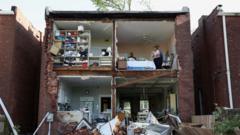Concerns over rare cancers and other illnesses in the Coldwater Creek community stem from potential exposure to radiation, prompting local activism and calls for government intervention.
Radiation Concerns Haunt Coldwater Creek Residents: A Tale of Illness and Activism

Radiation Concerns Haunt Coldwater Creek Residents: A Tale of Illness and Activism
Residents of Coldwater Creek, Missouri, face potential health risks from past nuclear waste and advocate for better government support.
The article text:
In the idyllic neighborhoods near Coldwater Creek, Missouri, what was once a picture-perfect American childhood is now marred by a chilling reality: a potential link to radiation exposure from World War Two-era activities. Kim Visintine has been on a quest for answers since her son, Zack, was diagnosed with an extremely rare type of brain tumor at just a week old. "Doctors were shocked," she recalls. "It was a one-in-a-million case." Despite intensive treatments, Zack succumbed to his illness at just six years old, prompting Kim to dig deeper into possible causes.
The community’s collective anguish regarding health issues erupted into action after growing concerns of radiation exposure from the Manhattan Project and the subsequent contamination of Coldwater Creek. After World War Two, uranium used in atomic bomb production was carelessly discarded near the waterway, raising fears of incurable diseases among local families. Many argue that the government has failed to respond adequately to their health crises.
A previous compensation program, the Radiation Exposure Compensation Act (RECA), expired last year before it could include residents in the St. Louis area. This program, which dispensed $2.6 billion in payouts to more than 41,000 claimants from other affected areas, left many feeling abandoned and seeking clarity about their health risks.
Researchers have connected radiation exposure to specific cancers, asserting that some cases in and around St. Louis could have been avoided without such exposure. The Environmental Protection Agency (EPA) has met with residents to discuss concerns and promises to continue remediation of the contaminated site until at least 2038. Meanwhile, community activists like Karen Nickel, who grew up near the creek, lament the stark change in their once carefree environment. "Fifteen people from my street have died from rare cancers," she says, underlining the ominous health trends affecting local families.
More disturbing stories emerge as Teresa Rumfelt describes the loss of every pet to cancer in her household and her sister's battle with amyotrophic lateral sclerosis (ALS). The local group Just Moms STL has formed to advocate for further investigation and compensation for affected families, emphasizing the urgent need for government support.
Healthcare providers have also started noticing trends concerning cancers among individuals living near Coldwater Creek. Dr. Gautum Agarwal, a cancer surgeon in St. Louis, urges greater awareness, emphasizing the importance of screening for patients with ties to the area. Conversely, some experts argue that while risks exist, the actual data suggests that the cancer rates among residents might not be as severe as perceived.
However, for residents like Kim, the fear of impending illness has created a culture of resignation. "In our community, there’s almost an acceptance that it's only a matter of time before we or someone we love gets sick," she said, highlighting the, often neglected, emotional toll of the situation.
The conversation continues in Coldwater Creek with lingering doubts and aspirations for justice as locals fight for acknowledgment and assistance from the government amidst uncertain health risks.
In the idyllic neighborhoods near Coldwater Creek, Missouri, what was once a picture-perfect American childhood is now marred by a chilling reality: a potential link to radiation exposure from World War Two-era activities. Kim Visintine has been on a quest for answers since her son, Zack, was diagnosed with an extremely rare type of brain tumor at just a week old. "Doctors were shocked," she recalls. "It was a one-in-a-million case." Despite intensive treatments, Zack succumbed to his illness at just six years old, prompting Kim to dig deeper into possible causes.
The community’s collective anguish regarding health issues erupted into action after growing concerns of radiation exposure from the Manhattan Project and the subsequent contamination of Coldwater Creek. After World War Two, uranium used in atomic bomb production was carelessly discarded near the waterway, raising fears of incurable diseases among local families. Many argue that the government has failed to respond adequately to their health crises.
A previous compensation program, the Radiation Exposure Compensation Act (RECA), expired last year before it could include residents in the St. Louis area. This program, which dispensed $2.6 billion in payouts to more than 41,000 claimants from other affected areas, left many feeling abandoned and seeking clarity about their health risks.
Researchers have connected radiation exposure to specific cancers, asserting that some cases in and around St. Louis could have been avoided without such exposure. The Environmental Protection Agency (EPA) has met with residents to discuss concerns and promises to continue remediation of the contaminated site until at least 2038. Meanwhile, community activists like Karen Nickel, who grew up near the creek, lament the stark change in their once carefree environment. "Fifteen people from my street have died from rare cancers," she says, underlining the ominous health trends affecting local families.
More disturbing stories emerge as Teresa Rumfelt describes the loss of every pet to cancer in her household and her sister's battle with amyotrophic lateral sclerosis (ALS). The local group Just Moms STL has formed to advocate for further investigation and compensation for affected families, emphasizing the urgent need for government support.
Healthcare providers have also started noticing trends concerning cancers among individuals living near Coldwater Creek. Dr. Gautum Agarwal, a cancer surgeon in St. Louis, urges greater awareness, emphasizing the importance of screening for patients with ties to the area. Conversely, some experts argue that while risks exist, the actual data suggests that the cancer rates among residents might not be as severe as perceived.
However, for residents like Kim, the fear of impending illness has created a culture of resignation. "In our community, there’s almost an acceptance that it's only a matter of time before we or someone we love gets sick," she said, highlighting the, often neglected, emotional toll of the situation.
The conversation continues in Coldwater Creek with lingering doubts and aspirations for justice as locals fight for acknowledgment and assistance from the government amidst uncertain health risks.




















